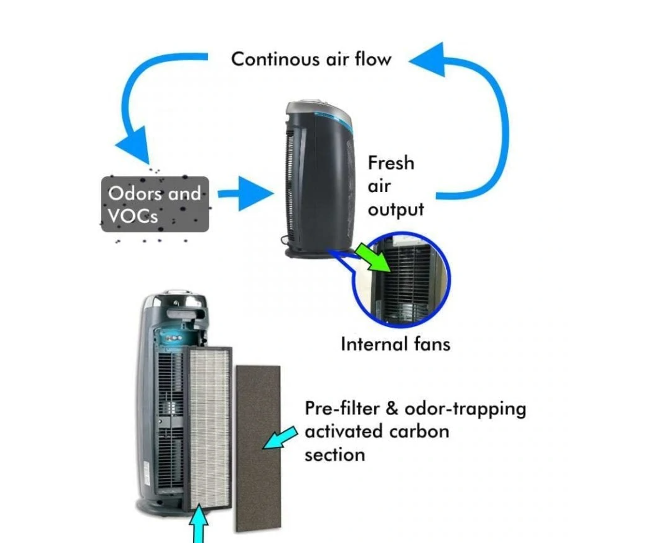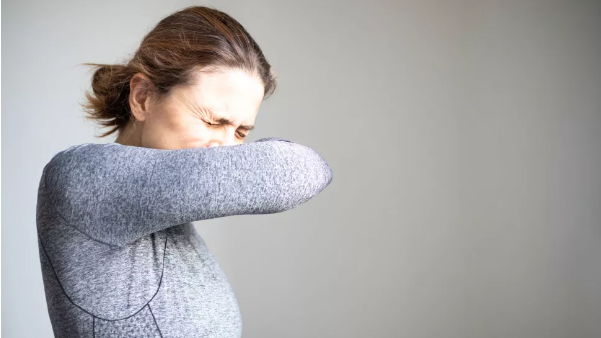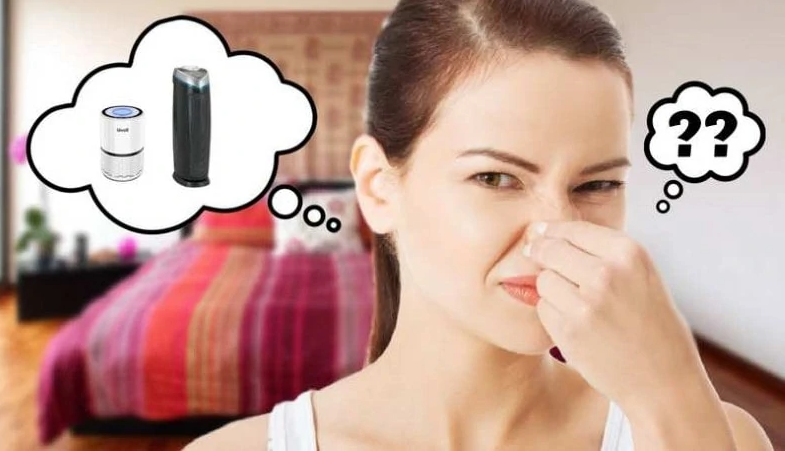You might have heard about all in one air purifier but what are the features that they offer? Do air purifiers help with smell or not? This article is a guide for you so, let’s get started
Possible sources for the smell

It’s not always easy to pinpoint the cause of a foul odor. A brief check may reveal, for example, that your cat’s litter box is overflowing or that your adolescent left a half-eaten pizza on their bedroom floor. Other times, determining the source of an odor is more difficult. Some of the most frequent scents include musty, chemical, and rotten.
Chemicals and odors
Is there an unpleasant, chemical odor in your home? VOCs (volatile organic compounds) can be released from a variety of sources. VOCs are chemical pollutants that are widespread in construction materials, paints, adhesives, cleaning agents, carpets, personal hygiene products, air fresheners, and other items.
VOCs are hazardous to one’s health, and continuous exposure can produce symptoms such as nose and throat irritation, shortness of breath, dizziness, migraines, and skin problems. High quantities of VOCs, if not treated, can cause harm to the lungs, liver, kidneys, and central nervous system, as well as cancer.
Do air purifiers help with smell?

According to research, humans can detect around one trillion odors that other living beings are incapable of. In case your house smells weird or the air indoors is polluted no matter how much you take care of and spend time cleaning it, you should probably go for the air cleaning devices, scents, or room fresheners. Perhaps, there is no point in using separate devices for every contaminant as it will be twice the cost.
However, as we are here speaking of whether or not an air purifier can remove the smell, the good news is, yes, they can. All you have to do is look out for the air purifier for smell. Many air purifiers presently remove the toxins like smoke, odor, and gases along with other contaminants from the air effectively. This happens because of the combination of different air purifier filters with includes HEPA filters and Activated Carbon filters mainly.
Why some smells are not eliminated by the air purifier?

Some air purifiers are incapable of removing smells from the air because of having the HEPA filters only. This is because HEPA filters remove 99.97% of microns (the traditional air purifiers) but they do not unable to capture gases, VOCs, etc.
However, many purifiers are designed to tackle bigger particles like pet dander, pollens, etc. The conventional air purifiers work on the principle of mechanical filtration in with it does not capture smell or gas.
The modern air purifier works the combination of electronic and mechanical filtration which is ideal to remove gases, VOCs, pollutants, etc. altogether.
What air purifier filters work efficiently for removing odor?
Following are the filters that help to remove every airborne or any pollutant from the air.
1. HEPA Air Filters
HEPA (high-efficiency particulate air) filters are intended to remove big particles, however, they do not remove smells, chemicals, gasses, or VOCs. This implies they are mostly useless against smells. To make matters worse, HEPA filters may operate as a source of musty, disagreeable scents. When pollutants like bacteria and mold become trapped on HEPA filters, they can proliferate over time if the filters are not updated, increasing unpleasant odors.
2. UV-C Light
Whereas a pure HEPA filter may be the ideal dark, damp breeding environment for bacteria, mold, and mildew, HEPA filters combined with a UV-C germicidal lamp may be more effective. UV-C stands for ultraviolet-C, a kind of radiation that destroys microorganisms by effectively rendering reproduction impossible. However, the efficiency of UV-C light air purifiers is unknown, as mold and bacteria would require a large dosage of light and contact time to be eliminated.
3. Carbon Air Filters
Filters that employ activated carbon to absorb airborne compounds, particularly VOCs that contribute to smell, are a potential choice for eliminating certain scents from the air. However, their performance is based on a few elements that should be considered while employing this strategy.
To begin, the amount of carbon utilized in the air filter has a significant impact on the filter’s capacity to remove smells, and the complexity (thickness) of carbon structures inside the air filter itself has a significant impact on the filter’s overall capabilities. Thin and cheap carbon filters often found on the market are frequently inadequate at eliminating smells, chemicals, and contaminants from the air. As a result, if activated carbon is an option, you may wish to evaluate the amount of activated carbon (in pounds) that is included in the air purifier.
Second, carbon air filters may have downsides due to a process known as off-gassing. This occurs when the carbon inside the filter becomes saturated or otherwise disturbed, such as by a sudden change in humidity or temperature, causing the filter to release VOCs back into the air. If carbon filtering is chosen, it is advised that a heavier weight of carbon is used and that filters be replaced when saturation occurs, albeit off-gassing may occur regardless of filter weight and saturation.
4. Molecule Technology; PECO
Though carbon filtration is a good short-term solution for smells, there is a longer-term solution that can assist deal with odor-causing VOCs in the air by eliminating airborne compounds at the molecular level. Photo Electrochemical Oxidation (PECO), a method of air purification developed over two decades by research experts, allows the Molekule air purifier to help eliminate smells from the air. This is especially crucial when the VOCs in the air are toxic, as the Molekule air purifier destroys these dangerous airborne compounds by breaking down molecular connections.
Molekule PECO technology removes smells by producing free radicals that degrade all VOCs, including those that generate odor. This implies that Molekule eliminates unpleasant to physically dangerous odors, and unlike carbon filters, Molekule does not merely capture but also destroys gasses.
What smells can an air purifier remove?
Investing in a good air purifier will help you to remove
1. Pet Smells
Cats, dogs, and all of our other furry companions are naturally stinky creatures who shed frequently, filling the home with pet dander and unpleasant aromas. Not only can pet dander be a nightmare for allergy sufferers, but pet odor in the home may be quite humiliating.
The most effective air purifiers will contain filters that will remove not just dander and hair shed by your pet, but also smells from pet beds and litter boxes. Not only will an air purifier in each main room make your home smell better, but it will also cleanse the air of many airborne contaminants that may make life miserable for individuals with allergies or asthma.
2. Food Smell
Health specialists recommend eating at least one meal of fish every week, but preparing fish may leave your house stinging for days. If you postpone preparing healthy omega-3-rich meals because you can’t bear the notion of dealing with post-dinner fish odor, an air purifier can undoubtedly assist.
An air purifier will not only help to reduce or eliminate the odor of your leftover fish dinner, but it will also help to reduce other food odors in your kitchen, such as the strong scent that lingers after cooking with delicious but strong-smelling spices like curry, or the smell of occasionally-burned chicken breast. If you arrive home from work and realize that your house has “foul breath,” bring out your trusty air purifier and turn it on high to instantly freshen up the air.
3. Smoke (Cigar or Cigarette)
Nobody enjoys the scent of smoke in their house, whether it’s from cigarettes or a weekend camping trip. Unlike other odors, the smell of smoke may be extremely difficult to remove, especially if it has had a chance to infiltrate your furniture, curtains, and carpet. If you want to substantially decrease or perhaps remove the smoking odor in your house once and for all, installing an air purifier to your room is a good first step.
There are several types of purifiers to select from, including:
- Electronic air cleaners
- Ionizers
- Mechanical particle air filters with high efficiency
They all function in various ways, but their goal is the same: to remove pollutants and smells from the air by trapping them in a filter or driving them to the ground to be removed with a vacuum.
4. Tash (Garbage)
If you’ve ever had the awful experience of smelling a day-old garbage can full of rotting meat or old vegetables, you know how difficult it can be to get rid of the stench, even after you’ve removed the garbage bag and rinsed out the trash can.
Rather than using an air freshener to cover the odor, use an air filter to collect the lingering, stinky particles that have escaped into the air from your garbage can. The scent of your house will improve dramatically when the particles become caught in the air filter.
Tips for How to Eliminate bad Smells from home?
Once you are done understanding the fact that do air purifiers help with smell then the next thing is the approach for eradicating an unpleasant odor in your house can vary depending on where it came from. After you’ve discovered and eliminated the cause of the stench, you may start removing it with proper cleaning, ventilation, and air purification
1. Make your room smell better
After you’ve removed the cause of the stench, cleaned and aired your home, you might want to add something to make it smell better. However, many store-bought devices that purport to improve indoor air quality actually worsen it. Ozone may be released into your house by air freshener sprays, while plug-in air fresheners and intensely scented candles emit additional VOCs. Try one of these choices to freshen up any area in your house:
- Diffuser with essential oils of your choice
- Oranges and aromatics simmer in pots
- Houseplants and flowers
- High-performance air purifiers
2. Ventilation
Contaminants such as allergens, VOCs, and smells become trapped and collect when an interior environment is not adequately ventilated. As a result, even in major, industrial cities, interior air can be more contaminated than outside air. Inadequate ventilation not only increases indoor pollution but also promotes mold and bacterium development.
High interior humidity levels, as evidenced by wet, dank air, might suggest that your house is not receiving adequate ventilation. Many HVAC systems regulate interior humidity and ventilate air, but if your air ducts or filters are unclean, using your HVAC system may aggravate the situation. The most immediate way to enhance the interior air quality is to open windows and doors to allow fresh air to flow. After you’ve turned them off, use a high-quality air purifier to remove any toxins that may have remained in the air.
3. Cleaning Suggestions
When it comes time to clean your house to eliminate the sources of unwanted scents, you should pick your cleaning products carefully. Using a chemical cleaning solution will simply increase the VOCs in the air. That is why it is critical to utilize natural cleaning chemicals and cleaning techniques that reduce the likelihood of recurring smells.
Wash curtains and rugs
Curtains, like dust, gather allergies over time and can generate unpleasant scents in the home; wash them every three to six months. Carpets accumulate a lot of dirt and filth just by being on the floor. Carpets should be vacuumed often to eliminate allergies, especially if you have pets, and washed at least once a year.
Can I make a cleaning solution at home?
Yes, you can make a fresh-smelling, natural cleanser out of common home items like vinegar, lemon, baking soda, and essential oils. To manufacture your own all-purpose cleaning solution,
- Combine 12 cups of white vinegar
- Two teaspoons of baking soda
- Essential oils of tea tree and eucalyptus.
Fill the balance of the spray bottle with water after adding this combination and it is ready to use. Spray small puffs and wipe it with a dry cloth.
Conclusion | Do air purifiers help with smell
When dealing with scents, it’s crucial to remember that humans’ capacity to smell isn’t simply a nice to have; it’s a survival tool. Humans, like animals, make critical judgments regarding the safety of a certain food or drug based on smell. If your house smells terrible, it might be due to the presence of poisons or other germs. Fortunately, there are numerous options for dealing with the scent and its cause, such as using the finest air purifiers for smells. In this article we have covered all the possible reasons and what should we use for to remove smells.
[A1]All in one air purifier wala article internal link kr lien
